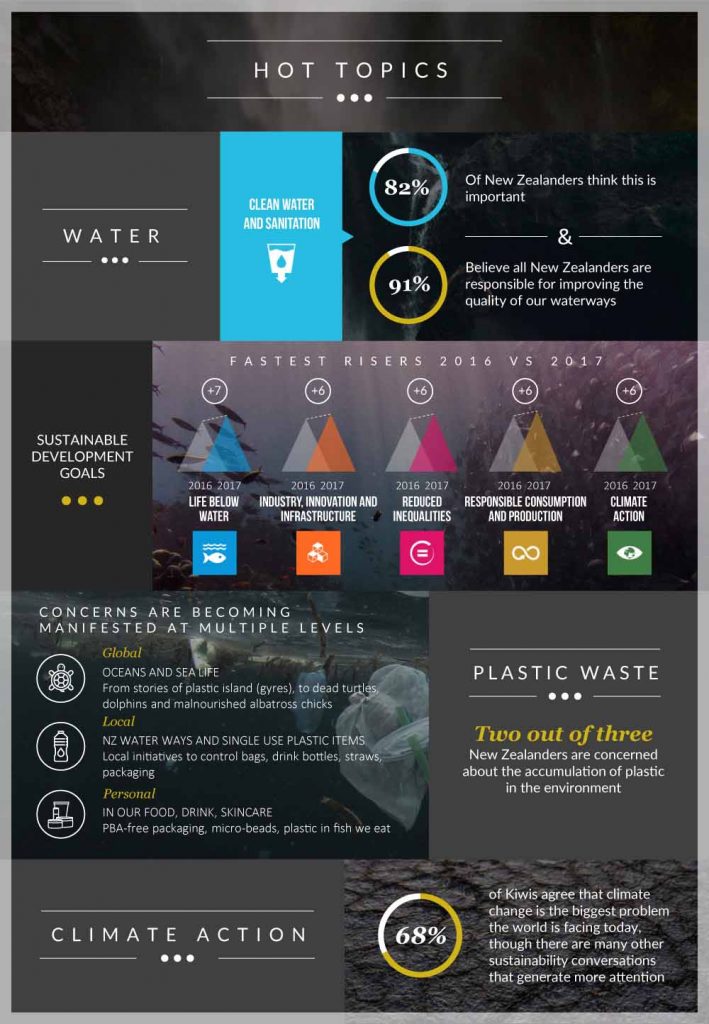Kiwis say not enough being done to keep New Zealand safe and healthy

Almost 90% of Kiwis are worried that not enough is being done to keep New Zealand safe and healthy according to new research by Colmar Brunton.
The Colmar Brunton Better Futures 2017 research, released this week, surveyed New Zealanders on a wide range of environmental and social issues, and found 87% worried about how little is being done in these areas.
Violence in society (69%), protecting our children (68%) and the increasing cost of living (68%) are the top three concerns for Kiwis. For the first time since the report’s inception in 2009, suicide rates (64%), build-up of plastic in the environment (63%), cleaning up New Zealand waterways (60%) and drugs/alcohol addiction in society (58%) were included in the top 10 concerns.
Colmar Brunton’s Chief Client Officer Sarah Bolger says this unprecedented level of concern has seen an increase in the number of New Zealanders taking steps themselves to address these issues, as well as having expectations of businesses and the Government to do more.
WATCH: 1NEWS interview Sarah Bolger
“When it comes to social and environmental issues such as protecting Kiwi kids and the increasing cost of living, people are looking to the Government for leadership to address them,” she says. “This was reflected in all the major political parties campaigning on these issues in the lead up to the 2017 election and in the Government’s new commitments to sustainability in the coalition agreement.”
“Business has a key role to play and Kiwi consumers are also taking matters into their own hands, increasing their sustainable behaviours to try and make a difference.”
Ms Bolger says the build-up of a plastic in the environment is an example of where consumers, government and business are on the same page, moving to reduce reliance on single use plastic bags.
In 2016 there was a step change with more New Zealanders expressing a moderate commitment to living a sustainable lifestyle than ever before.
“In 2017, this shift has remained consistent, but there has also been an increase of 5% to almost a third of all New Zealanders who consider themselves to be highly committed to a sustainable lifestyle,” Ms Bolger says.
Kiwis are taking a number of practical steps to live sustainably. Almost all of those surveyed claim that some, most, or all, of the time, they: recycle (97%); are energy efficient at home such as by using eco-friendly light bulbs and energy efficient appliances (95%); and buy locally produced and grown products (93%).
Compared to 2014, the biggest movements in sustainable behaviour have seen 7% more Kiwis willing to pay a bit more to get the best organic, sustainable and ethically produced products available (69%); a 7% increase in the number of people maintaining a vegetarian or vegan diet (27%); and a 5% increase in the number of people not using plastics bags from the supermarket and shops (83%).
More than half the population (56%) are using public transport, up 5% from 2016. However, only 19% of Kiwis are offsetting their carbon emissions when they fly, a minor increase of 3% on last year’s figures suggesting that airlines have more work to do to marry the public’s interest in climate action with flight purchase behaviour.
Our older generations are leading the way in living sustainably. More people aged 60 and older use public transport (63%), buy locally produced and grown products rather than imported ones (98%), and grow their own fruit and vegetables (85%) compared to other age groups.
However, those aged 18-29 years old lead the way in using alternative transport, such as cycling or walking (82%). More people in the 30-39 age group maintain a vegetarian or vegan diet (36%) and consider green energy sources for their homes (66%). Those aged 40-49 years old are the highest users of reusable water bottles or coffee cups.
Women are also leaders in living sustainably, with more women saying they’ll buy organic food and beverages compared to men (76% v 66%), buy fair-trade products (83% v 72%), growing their own fruit and vegetables (80% v 73%) and eating a vegetarian meal at least once a week (72% v 55%).
Ms Bolger says people understand there is some value attached to being more sustainable and are getting better at proactively addressing environmental issues. But in order to enable mainstreaming of behaviour, being sustainable must also be affordable and easier.
“It’s clear that living sustainably in 2017 is quite different to three years ago. Living sustainably now goes hand in hand with living more economically through initiatives like growing your own vegetables, recycling plastics and reusing things like water bottles and coffee cups. These are practical steps people can take that also help our environment.”
The Sustainable Business Council says it is great to now have a couple of years of data to see how New Zealanders behaviours and views are changing over time.
“This research shows that every year the number of New Zealanders highly committed to living a sustainable lifestyle grows. When 30% of a population say they are highly committed to living a sustainable lifestyle, they have clearly become a target market in their own right,” said executive director Abbie Reynolds.
“But if seven out of 10 New Zealanders can’t name a brand they consider a leader in sustainability, this shows there’s a huge opportunity for businesses that are doing it well to connect with consumers. As conscious consumerism grows overtime, it’s increasingly going to be the company or brand’s job to help them understand how they can make more sustainable choices.”
“Perhaps the greatest surprise out of this research is that one of the key consumers driving the change in behaviour are low income earners, as well as women and people 60 or older. It’s often been assumed that conscious consumerism is driven by the middle class, but when we see lower income households taking this direction it tells you these issues are of concern to all New Zealanders,” said Abbie Reynolds.
Public Relations and Corporate Social Responsibility expert Nikki Wright of Wright Communications says consumers need businesses not only doing the right thing but also connecting with them and being clear about what they are doing.
“While brands and businesses are getting better at telling their sustainability stories to consumers, there is still a long way to go,” she says. “Almost three quarters of Kiwis are still confused by or struggling to understand what brands are doing in this space.”
“Consumers want to support sustainable brands, so if the brands can make it easy for them by telling their stories better, they will sell more goods and services and consumers will feel better about themselves – everybody wins.”
Top 10 concerns for New Zealanders
- Violence in society (69%)
- Protection of New Zealand children (68%)
- Increasing cost of living (68%)
- Suicide rates (64%) (NEW)
- Build-up of plastic in the environment (63%) (NEW)
- Not having access to good, affordable healthcare (62%)
- Cleaning up of New Zealand waterways (60%) (NEW)
- Pollution of lakes and seas (60%)
- Lack of affordable housing (59%)
- Drugs/alcohol addiction in society (58%) (NEW)
Top 10 activities New Zealanders are doing to be sustainable (some, most, or all of the time)
- Recycle paper, plastics, glass and tins (97%)
- Be energy efficient in your home e.g. use eco-friendly light bulbs, use efficient appliances (95%)
- Buy locally produced and grown products rather than imported ones (93%)
- Use a reusable water bottle or coffee cup (92%)
- Not use plastic bags from supermarkets and shops (83%)
- Buy eco-friendly cleaning products (83%)
- Buy fair-trade products (78%)
- Use alternative transport e.g. cycling, walking (76%)
- Grow your own fruit and/or vegetables (76%)
- Buy organic foods / beverages (72%)
Biggest movements in sustainable behaviour
- Not use plastic bags from supermarkets and shops (83%) +5% from 2014
- Willing to pay a bit more to get the best organic, sustainable and ethically produced products (69%) +7% from 2014
- Use public transport (56%) +5%
- Maintain a vegetarian/vegan diet (27%) +7% from 2014
- Pay to offset the carbon emissions of your flights (19%) +3% from 2014.


SARAH BOLGER
Chief Client Officer
[email protected]
Insight and thinking
Read our latest articles and reports, with expert perspective, proprietary data, and thought-provoking insights.